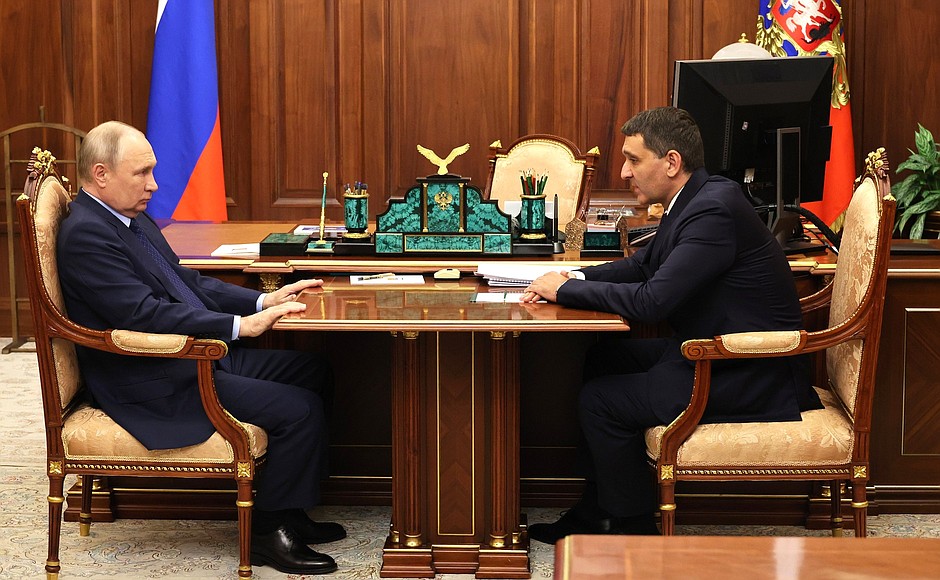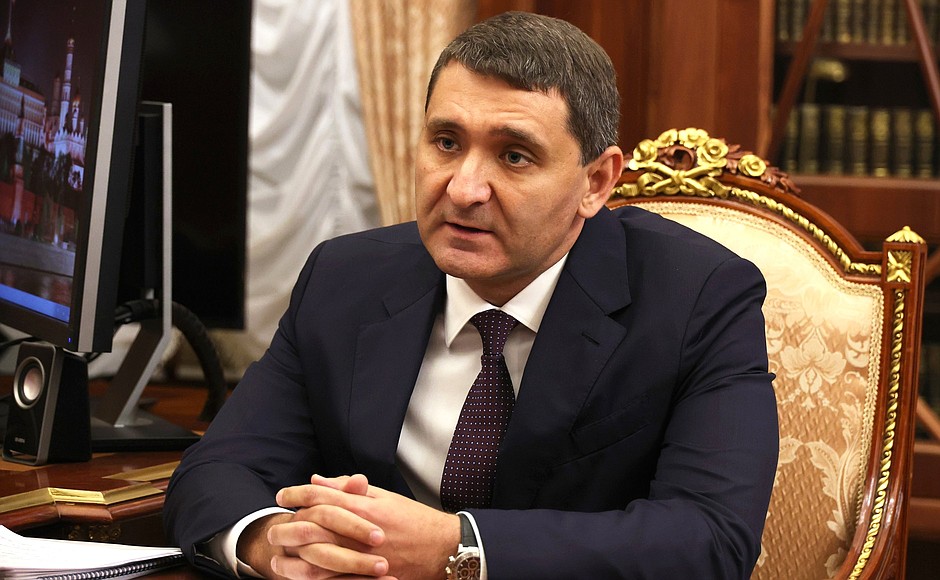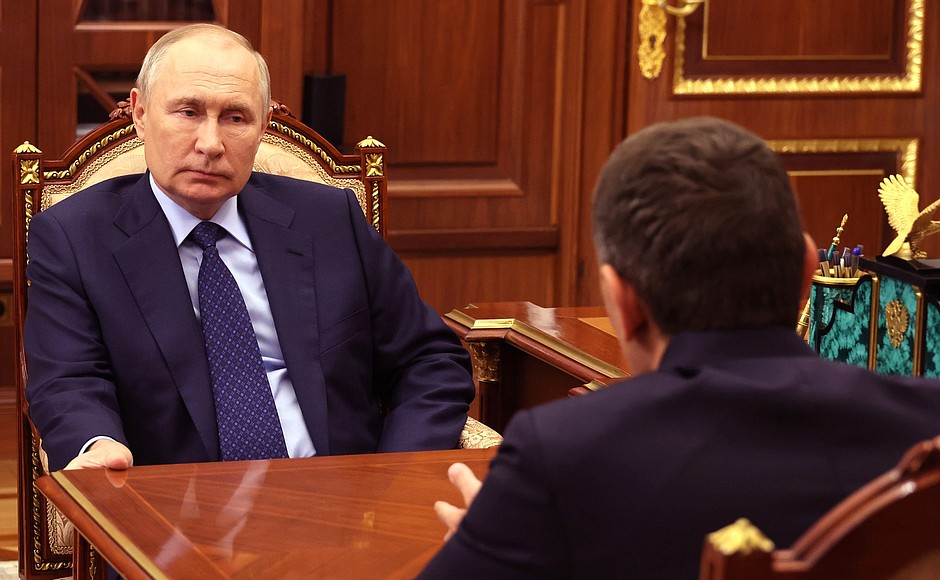President of Russia Vladimir Putin: Mr Ryumin, you have over 500,000 substations and almost 2.5 million kilometres of power lines. Your company is huge. The last time we met was about a year ago. What has happened since then?
Rosseti CEO Andrei Ryumin: Mr President,
I would like to begin my report with what is probably the most important event that happened this year, the reorganisation of the group through consolidation of distribution companies into the federal grid company, that is, into the main grid. This objective was set a long time ago. At the beginning of this year, we completed the consolidation process and now we have an integrated centre for responsibility and management of both the main grid and the distribution complex.
I can say that all the goals that we have set in relation to the consolidation were fulfilled. In particular, we were able to reduce administrative costs by over 5 billion rubles.
As for production performance, as you have already mentioned, we have almost 2.5 million kilometres of power lines. The total capacity of our substations is 835 gigavolt-amperes. We currently employ over 230,000 people, which is a really huge team. Naturally, we prioritise the social guarantees for our employees and the implementation of relevant tariff agreements signed with them.
Vladimir Putin: Are you adjusting their salaries for inflation?
Andrei Ryumin: I was just about to say that in accordance with the tariff agreements, we have adjusted their salaries by almost 16 percent.
As for financial indicators, we increased our revenue in 2022.
Vladimir Putin: What is the average salary in the company?
Andrei Ryumin: 73,300 rubles.
We finished last year with a revenue growth of 6.5 percent. It was slightly more than 1.18 trillion rubles.
Our profit has also increased compared to last year, and it was due to this profit that we were able to partially finance our investment programme.
I say partially, because our investment programme last year was a record one, at 435 billion rubles, which is 110 billion rubles higher than over the same period [the previous year], that is, over the same period in 2021. I can say that all this growth took place in the main grid including the fulfilment of state tasks and major important construction projects, above all the power supply of the Eastern Operating Domain, of course. Mr President, in line with your instructions that you issued last year we will complete the first stage of the power supply to the Eastern Domain in the near future.
I also wanted to say that a lot of other projects under the investment programme were implemented according to the approved investment programme and the schedules we adopted. We have introduced about 10 gigavolt-amperes of new transformer capacity and built about 30,000 kilometres of power lines.
Mr President, in line with your instructions for consolidation, we are expanding our presence. In June, at a shareholders’ meeting, a decision was made (previously approved by the board of directors) to issue additional Rosseti shares. Electric grid companies in the Novosibirsk Region, as well as electric grid companies in the Republic of Crimea and the Krasnoyarsk Territory will be included in the authorised capital. Also, as part of these consolidation assignments, we are dealing with ownerless networks, which are a big problem.
I can say that about 23,000 facilities have been identified in 2022–2023 and are in the process of being put on the balance sheet.
Vladimir Putin: All of them ownerless?
Andrei Ryumin: Yes, they are. This is a very large number for us. I can tell you that there were fewer networks identified over the previous five years than we identified over these two years (2022 and part of 2023), and, partially, put on the balance sheet.
Perhaps one of the most important tasks for us was working in the new regions of the Russian Federation. We began this work in the spring of 2022, with almost all of our subsidiaries involved. I can say that work to restore facilities in the territories of all four new regions of the Russian Federation is still underway; today, we have restored power supply to more than 1,000 apartment buildings, over 37,000 houses, and more than 40 schools and kindergartens. We have, of course, restored the power supply to housing and utilities sector facilities such as pumping stations, boiler houses, and also, of course, hospitals, clinics and other facilities.
However, in addition to restoration in accordance with the resolution of the Russian Federation Government, we are beginning to use the entire main grid in all four new regions of the Russian Federation.
I would also like to say that we consider coping with the autumn-winter heating season our priority each year. One can say that we passed the previous 2022–2023 period quite well, and we had fewer massive power outages than during the same period in 2021–2022. In effect, our indicators improved in 2022 and 2023. We also expanded the 2022 repair programme that received 86.5 billion rubles or ten percent more than in the previous period. This year, we are also expanding the repair programme, which is due to receive about 91 billion, but I believe that it will be even more than 91 billion.
Vladimir Putin: This is even more than last year.
Andrei Ryumin: This is almost five billion rubles more than last year.
Of course, we have failed to ensure 100 percent reliability, and some of our regions have extremely rundown networks and very high wear-and-tear rates, in excess of 75 percent. For this reason we have more power cuts in autumn and winter, marked by unfavourable weather conditions. These wear-and-tear levels also affect summer-time outages, due to high temperatures and heat waves. We are teaming up with regional and federal authorities to address these issues. If you will allow me, I would like to tell you about this separately and in greater detail.
Vladimir Putin: Ok.
Andrei Ryumin: I would also like to discuss the connection of new facilities to power networks. Last year, we fulfilled 413,000 contracts stipulating 14-gigawatt power-network connections. In January-June 2023, we implemented over 200,000 contracts. What is important is that subsidised categories account for 95 percent and, maybe, even over 97 percent. In other words, we connect individuals, small businesses, medium-sized businesses, meaning categories entitled to benefits.
This probably concludes my report.
I would like to dwell briefly on our objectives. We have many objectives, and we are working in 82 regions. However, the successful completion of the 2023–2024 heating season is, of course, our main objective. We need to fulfil all our investment programmes and complete the issue of additional shares before the year is out.
The operation of power grids in the Donetsk and Lugansk people’s republics, the Zaporozhye and Kherson regions probably ranks among our main tasks. These tasks are important and complicated, but I am confident that we will cope with them.
<…>


